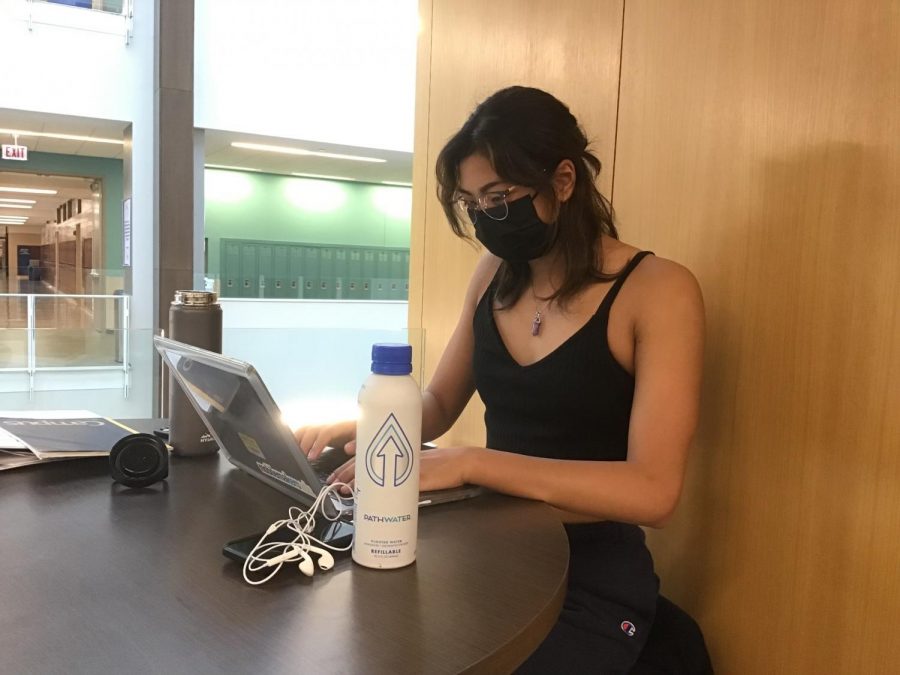Students upset over inadequate WiFi and cell service
Students find themselves asking, “Why is the WiFi so bad here?”
Junior Charlize Escasa finishes homework on her laptop. Students require WiFi to use different devices, including iPads, laptops, and phones.
Since the beginning of the school year, students have noticed inconsistencies with the student WiFi and cell service at the Winnetka campus, some even describing the network connection as “unreliable” and “horrendous.”
Junior Alexandra Plovanic is one student who described the WiFi as “infuriating.”
“Personally, I feel like it’s pretty bad,” she said. “Anyone would say that, but it can even be detrimental to classes.”
Junior Amelia Schotz recalls a recent incident where the WiFi failed to support their class as they were taking a quiz.
“Yesterday, everyone got kicked out of our French class quiz at the same time. The WiFi was like, ‘I’ma head out,’” said Schotz.
Plovanic estimates that the WiFi only works around 60% of the time. Schotz says she can more or less agree with this statistic.
“The WiFi usually works. The problem is that the school knows how many people are at this school, so they should have a router that always works,” Schotz said.
According to Chief Technology Officer Michael Marassa, the WiFi slows or drops when too many students and devices are using a wireless network access point at the same time.
“If somebody’s streaming Netflix or playing a game, they have higher bandwidth constraints. The more people that are using higher bandwidth, it causes things to congest,” said Marassa.
Like Schotz, Sophomore Lilly Lipford considers the student Wifi untrustworthy, and finds herself switching to the guest network during class to stay connected.
Lipford said, “It’s not too bad, but it can be really annoying sometimes and take away focus from class.”
Lipford noted the scrounge and debate room as two places where she found the WiFi to be particularly dysfunctional.
Marassa says that the WiFi discrepancies students see across the building are due to better points of connectivity in newly renovated areas. In response, he and his team hope to have a renovation done in which the network connection in older areas of the building can be “remediated.”
“We are in the process of putting together a budget plan that we hope to bring to the Board in December, to upgrade all the equipment that’s on the first, second, and fourth floor of the East side of the campus,” said Marassa. “This project could take as long as 6-8 weeks, and we’re targeting June or July to start.”
Besides improving the connectivity of the WiFi, Marassa also estimates that the plan will be pricey.
“We’re looking at recabling and putting in new switches, which will increase the bandwidth in classrooms almost immediately,” he said. “The total project could be as much as $1.5 million. But we want to make sure we have a robust infrastructure that is reliable, has good performance, and is secure.”
Because the network renovations are scheduled to take place in the summer, students will have to endure the current state of the WiFi for now.
“There is nothing that I can snap my fingers and change, because if there was, my team would have fixed it already,” said Marassa.
Besides WiFi, students also report that they struggle with finding cell signals in the building.
“The cell service is more infuriating than the WiFi, because when I try to call to be picked up from theater practice, I have to take the calls down in the scrounge. If you take the calls on the first floor, they don’t go through,” said Plovanic.
Lipford says she also has trouble calling and texting in the school vicinity.
“I meet a friend for sailing after school, but I never know where she is because my texts won’t send, and when I call her, it fails,” she said. “Sometimes it works, but it does make it hard to find her.”
Marassa and his team do not have a long-term solution to fix the cell service.
“In this geographic area, there is not a lot of radio coverage to start with, and the school is an older building that has a lot of concrete. So, the radio signal coming in is limited,” he said. “I don’t anticipate it’ll get any better.”
Overall, students believe that the student WiFi and cell service at New Trier could use improvement.
“We need WiFi for class and to contact our parents and friends,” said Lipford. “It’s important for school.”








































